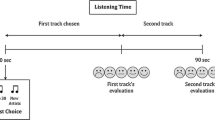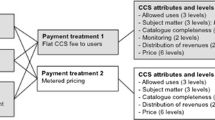Abstract
In this study, we analyze that how free goods, such as music video provided freely, affect sales of contents in the Japanese creative industries. The contributions of this study are below three points: (1) we focus on three major creative industries: music industry, video industry, and book industry. (2) We focus on the impact of both licensed and unlicensed free goods. (3) We use a large amount of questionnaire survey data, and then we use unique instrumental variables “Preferences of using free goods on the Internet.” As the results, licensed free goods have a significant positive effect on paid goods in the music industry with an elasticity of 0.11, but no significant effect in the video and book industries. Unlicensed (pirated) free goods have no significant effects in the book industry, but have a significant negative effect in the music and video industries with elasticities of − 0.23 and − 0.19, respectively.

Source: The Recording Industry Association of Japan

Source: International Federation of the Phonographic Industry (2019)



Similar content being viewed by others
Data availability statement
The datasets generated during and/or analyzed during the current study are not publicly available because respondents did not consent to the release of their individual data.
Notes
Freemium is the business model whose baseline service is free to use and users pay charge to use premium service (Anderson 2009).
We do not consider the game industry in this study. Games are goods encompassing consumers’ own experiences, so pirated copies are not circulating via convenient service such as video sharing websites. Furthermore, mobile games that belong to a significantly different business model are becoming mainstream in the game industry.
For example, although the size of the market for books (physical goods) in Japan peaked at about 1,100 billion yen in 1996, now it is about 740 billion yen (All Japan Magazine and Book Publisher’s and Editor’s Association, 2016).
In brief, we assume that the utility derived from free online distribution is smaller than the utility derived from paid goods. Piolatto and Schuett (2012) also made this assumption.
If the usage time of official free goods increases by 1%, the consumption of paid goods increases by about 0.11%.
References
Adermon A, Liang CY (2014) Piracy and music sales: the effects of an anti-piracy law. J Econ Behav Organ 105:90–106
Aguiar L (2017) Let the music play? Free streaming and its effects on digital music consumption. Inf Econ Policy 41:1–14
Aguiar L, Martens B (2016) Digital music consumption on the internet: evidence from clickstream data. Inf Econ Policy 34:27–43
Aguiar L, Waldfogel J (2018) As streaming reaches flood stage, does it stimulate or depress music sales? Int J Ind Organ 57:278–307
Andersen B, Frenz M (2010) Don’t blame the P2P file-sharers: the impact of free music downloads on the purchase of music CDs in Canada. J Evol Econ 20(5):715–740
Anderson C (2009) Free: the future of a radical price. Random House, London
Bai J, Waldfogel J (2012) Movie piracy and sales displacement in two samples of Chinese consumers. Inf Econ Policy 24(3–4):187–196
Barker G, Maloney T (2015) The impact of internet file-sharing on the purchase of music CDs in Canada. J Evol Econ 25(4):821–848
Blackburn D (2004) On-line piracy and recorded music sales. Unpublished manuscript, Harvard University, pp 1–60
Bourreau M, Doğan P, Hong S (2015) Making money by giving it for free: Radiohead’s pre-release strategy for In Rainbows. Inf Econ Policy 32:77–93
Crupnick R (2016) Bad company, you can’t deny [Blog post]. Music Watch. http://www.musicwatchinc.com/blog/bad-company-you-cant-deny/
Danaher B, Smith MD, Telang R, Chen S (2014) The effect of graduated response anti-piracy laws on music sales: evidence from an event study in France. J Ind Econ 62(3):541–553
Datta H, Knox G, Bronnenberg BJ (2018) Changing their tune: how consumers’ adoption of online streaming affects music consumption and discovery. Mark Sci 37(1):5–21
Dewenter R, Haucap J, Wenzel T (2012) On file sharing with indirect network effects between concert ticket sales and music recordings. J Media Econ 25(3):168–178
Fukugawa N (2011) How serious is piracy in the videogame industry? Empir Econ Lett 10(3):225–233
Gavric G, Krstic M (2017) Creative industries as a factor of economic development of Serbia. Economic and technological development and information technology, pp 51–68
Hardy W (2021) Displacement from piracy in the American comic book market. Inf Econ Policy 57:100927
Hiller RS (2016) Sales displacement and streaming music: evidence from YouTube. Inf Econ Policy 34:16–26
Im H, Song H, Jung J (2019) The effect of streaming services on the concentration of digital music consumption. Inform Technol People
International Federation of the Phonographic Industry (2019) Global music report: State of the industry 2019. http://www.ifpi.org/downloads/GMR2019.pdf
Kaiser U, Kongsted HC (2012) Magazine “companion websites” and the demand for newsstand sales and subscriptions. J Media Econ 25(4):184–197
Kim D, Park K, Bang Y (2022) The effect of TV drama piracy: an analysis of digital piracy users, internet buzz, and TV drama viewership. Inform Manage 103599
Kretschmer T, Peukert C (2017). Video killed the radio star? Online music videos and recorded music sales. CEP Discussion Paper, 1265.
Lee JF (2018) Purchase, pirate, publicize: Private-network music sharing and market album sales. Inf Econ Policy 42:35–55
Leung TC (2015) Music piracy: bad for record sales but good for the iPod? Inf Econ Policy 31:1–12
Liebowitz SJ (2008) Research note—testing file sharing’s impact on music album sales in cities. Manage Sci 54(4):852–859
Liebowitz SJ (2016) How much of the decline in sound recording sales is due to file-sharing? J Cult Econ 40(1):13–28
All Japan Magazine and Book Publisher’s and Editor’s Association (2016) Annual report on the publication market. Tokyo, Japan.
Martikainen E (2014) Does file-sharing reduce DVD sales? NETNOMICS: Econ Res Electr Netw 15(1):9–31
McKenzie J, Walls WD (2016) File sharing and film revenues: estimates of sales displacement at the box office. BE J Econ Anal Pol 16(1):25–57
Mortimer JH, Nosko C, Sorensen A (2012) Supply responses to digital distribution: recorded music and live performances. Inf Econ Policy 24(1):3–14
Murillo AC (2013) Music piracy and illegal sharing: are artists being affected? Criterio Libre 18:113–124
Nguyen GD, Dejean S, Moreau F (2014) On the complementarity between online and offline music consumption: the case of free streaming. J Cult Econ 38(4):315–330
Oberholzer-Gee F, Strumpf K (2007) The effect of file sharing on record sales: an empirical analysis. J Polit Econ 115(1):1–42
Peitz M, Waelbroeck P (2004) The effect of internet piracy on CD sales: cross-section evidence. CESifo Working Paper Series, 1122
Peukert C, Claussen J, Kretschmer T (2017) Piracy and box office movie revenues: evidence from Megaupload. Int J Ind Organ 52:188–215
Piolatto A, Schuett F (2012) Music piracy: a case of “the rich get richer and the poor get poorer.” Inf Econ Policy 24(1):30–39
Poort J, Rutten P, Van Eijk N (2010) Legal, economic and cultural aspects of file sharing. Commun Strateg 77:35–54
Poort J, Quintais J, van der Ende MA, Yagafarova A, Hageraats M (2018) Global online piracy study. Amsterdam Law School Research Paper, (2018–21)
Smith MD, Telang R (2016) Windows of opportunity: the impact of piracy and delayed international availability on DVD Sales. Available at SSRN 2784759.
Tanaka T (2020) Possibility of a manga subscription service to counter manga piracy. Inform Commun Pol Rev 3(2):127–150
Tanaka T (2004) Does file sharing reduce music CD sales? A case of Japan. IIR Working Paper, 05–08. Hitotsubashi University
Wooldridge JM (2010) Econometric analysis of cross section and panel data, 2nd edn. The MIT press, Cambridge
Yamaguchi S (2021) The effect of online C2C markets on new-product-purchasing behavior: an empirical analysis of Japanese selling apps. SN Bus Econ 1(1):1–21
Ernst and Young (2015) Cultural times—the first global map of cultural and creative industries. http://www.cisac.org/CISAC-University/Library/Studies-Guides/Cultural-Times-The-First-Global-Map-of-Cultural-and-Creative-Industries
Yu Y, Chen H, Peng CH, Chau PY (2022) The causal effect of subscription video streaming on DVD sales: evidence from a natural experiment. Decis Support Syst 157:113767
Yue Y (2020) The effects of movie piracy on box-office revenue: an empirical analysis of the Chinese movie market. J Appl Econ 23(1):618–655
Acknowledgements
This work was supported by JSPS KAKENHI Grant Number 16K21447, 18K12882 and JP21K12586. We are very grateful for this support.
Funding
This work was supported by JSPS KAKENHI Grant Number 16K21447, 18K12882 and JP21K12586.
Author information
Authors and Affiliations
Corresponding author
Ethics declarations
Conflict of Interest
The authors declare that they have no conflicts of interest.
Ethical approval
All study participants provided informed consent, and the study design was approved by the appropriate ethics review board.
Informed consent
Consent was obtained from the respondents when data were obtained.
Rights and permissions
Springer Nature or its licensor (e.g. a society or other partner) holds exclusive rights to this article under a publishing agreement with the author(s) or other rightsholder(s); author self-archiving of the accepted manuscript version of this article is solely governed by the terms of such publishing agreement and applicable law.
About this article
Cite this article
Yamaguchi, S., Sakaguchi, H., Iyanaga, K. et al. The impact of licensed and unlicensed free goods: an empirical analysis of music, video, and book industries in Japan. SN Bus Econ 3, 65 (2023). https://doi.org/10.1007/s43546-023-00439-y
Received:
Accepted:
Published:
DOI: https://doi.org/10.1007/s43546-023-00439-y




